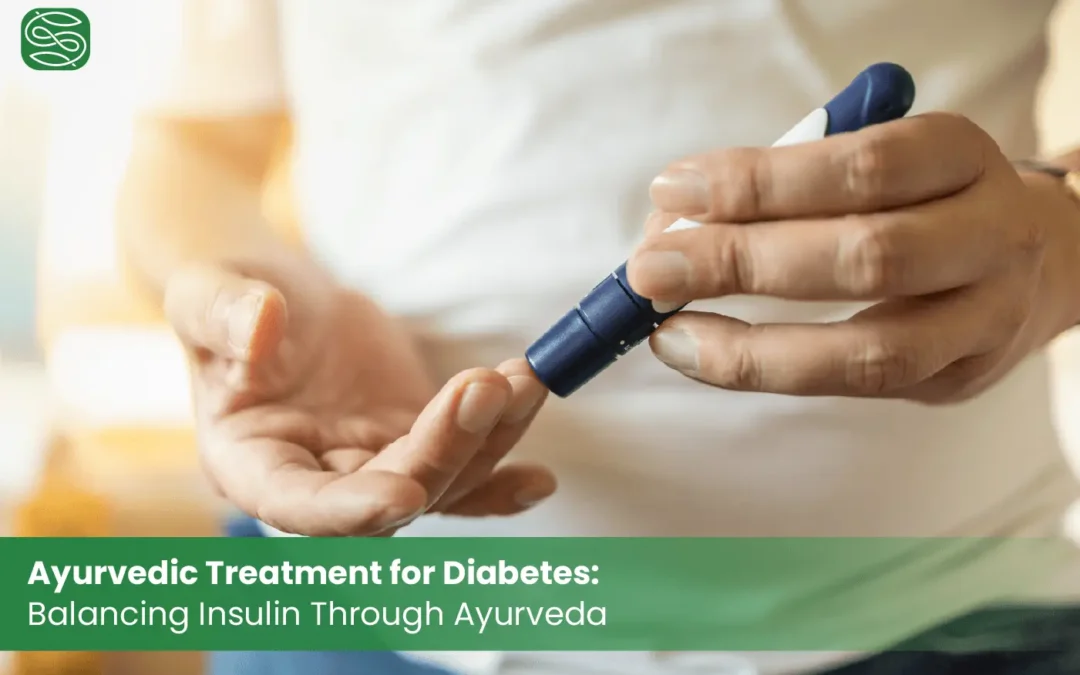Introduction:
Imagine waking up feeling drained, even after a whole night’s rest. You find yourself endlessly thirsty, reaching for glass after glass of water. For millions in India and worldwide, these subtle signs indicate more than fatigue; they signal diabetes. According to an estimate from 2021, over 74 million Indians were diagnosed with diabetes, and the number is expected to rise to over 124 million by 2045.
Diabetes is a condition that goes beyond diet changes, requiring a deep understanding of the balance between Insulin and the body. But there’s hope. Ayurvedic treatment for diabetes, including therapies like Panchakarma, offers a natural path to restore balance and well-being. Let’s explore this holistic journey together.
Ayurveda Understanding of Diabetes:
In Ayurveda, diabetes is a condition characterized by high sugar levels in the urine. It occurs when blood sugar rises beyond a certain point and can be detected in the urine. The ancient understanding of this condition highlights metabolic imbalances that disrupt body tissues. Ayurvedic treatment for diabetes identifies poor digestion as the leading cause, with weak digestion producing toxins that affect insulin production in the pancreas.
Types of Diabetes
Understanding the types of diabetes is critical to managing the condition effectively. Each presents unique challenges and care needs. Here are the types of diabetes.
Type 1 Diabetes: Type 1 diabetes is specified by an autoimmune response that stops the body from producing insulin. It is generally diagnosed in children, teenagers, and adults. If a person has type 1 diabetes, he must take Insulin every day to survive.
Type 2 Diabetes: The body does not respond effectively to Insulin with type 2 diabetes and cannot maintain normal blood sugar levels. It develops over time and is typically diagnosed in adulthood. Healthy lifestyle habits such as decreasing weight, consuming nutritious foods, and staying active can hinder or delay type 2 diabetes.
Gestational Diabetes: Gestational Diabetes is often occurs in pregnant women who have never diagnosed before. If a woman has gestational diabetes, the baby may be at risk of health complications. Gestational diabetes often resolves after childbirth, but it increases the likelihood of developing type 2 diabetes in life.
Pre-diabetes: Pre-diabetes is characterized by a person having blood sugar levels higher than usual but not high enough to be defined as type 2 diabetes. Pre-diabetes puts one at risk for type 2 diabetes, heart disease, and stroke.
Risk Factors in Type 2 diabetes include:
Recognizing the risk factors for type 2 diabetes is crucial for prevention and management. Here are the key factors to be aware of.
Weight: Obesity is a significant cause of type 2 diabetes, as excess weight increases the body’s insulin resistance. If you have concerns about being overweight, consult a doctor. A balanced, low-fat diet and regular exercise can aid in gradual and consistent weight loss.
Age: Type 2 diabetes tends to become more prevalent with age, especially after 45. While aging is unavoidable, addressing other risk factors can help reduce the risk.
Pregnancy: The only type of diabetes that occurs exclusively during pregnancy is called gestational diabetes. Approximately half of women with gestational diabetes are diagnosed with type 2 diabetes within 15 years of giving birth. Babies weighing nine pounds or more are at a higher risk of developing type 2 diabetes in the future, even in the absence of gestational diabetes.
Polycystic ovary syndrome (PCOS): This is a disorder that develops when a woman’s body experiences an imbalance in hormone levels, leading to the formation of ovarian cysts. PCOS-afflicted women are more likely to acquire type 2 diabetes.
Smoking and alcohol: Using smoke and alcohol can raise the risk of type 2 diabetes.
Panchakarma Therapy for Diabetes
Panchakarma therapy, an essential aspect of Ayurvedic diabetes treatment, helps manage disease. Patients first receive pre-procedure therapy to help them prepare for future procedures. Toxins are removed through Oleation therapy, which also unblocks circulation channels. Subsequently, the patient is given a steam bath to help the body clear these wastes.
Panchakarma therapies can help detoxify the body, rejuvenate organs, and restore balance to doshas. For diabetes management, the following Panchakarma treatments are recommended:
- Virechana (Purgation Therapy)
Virechana helps in detoxifying Pitta and Kapha doshas. It cleanses the liver, pancreas, and intestines, which are crucial organs involved in glucose metabolism. This therapy is particularly beneficial for regulating blood sugar levels. - Basti (Medicated Enema)
This therapy is effective for managing Vata-related imbalances, which often manifest in advanced stages of diabetes. Different types of Basti, such as Anuvasana and Niruha, can improve insulin production, nourish tissues, and maintain energy balance in the body.
Panchatikta Ksheera Basti (Medicated Milk Enema)
This therapy is especially useful in cases of diabetic neuropathy. It nourishes and strengthens nerves and muscles, alleviating symptoms like numbness and burning sensation.
- Udwartana (Herbal Powder Massage)
Udwartana is a dry, powder-based massage that helps in reducing body fat and improving blood circulation. It is useful for diabetic patients with obesity or excess weight. - Abhyanga (Herbal Oil Massage)
A full-body massage with medicated oils can balance doshas, improve circulation, reduce stress, and promote the removal of toxins from the body. This is essential for diabetic patients experiencing neuropathy or skin problems. - Swedana (Herbal Steam Therapy)
Swedana induces sweating and helps eliminate toxins through the skin. It enhances the effects of Abhyanga and is beneficial for improving metabolism.
Yoga:
Yoga therapy is a significant addition to Ayurvedic treatment for diabetes. Through specific body postures, it boosts metabolism, improves glucose homeostasis, and improves organ function. Yoga also improves physical strength, blood circulation, and oxygenation, allowing diabetic patients to recover faster.
Conclusion:
Diabetes management is a path to thriving, not just surviving. With the support of modern medicine or Ayurvedic therapies like Panchakarma, and positive lifestyle shifts, you can regain control and live fully. Embrace wellness and discover a healthier, more balanced you.
If you’re looking for Ayurveda treatment for diabetes in Bangalore, Shathayu Ayurveda offers a comprehensive program combining Panchakarma therapies, herbal medicines, and lifestyle modifications. The focus is on detoxifying the body, balancing doshas, and managing blood sugar levels naturally. The Ayurveda treatment for diabetes includes therapies like Vamana, Virechana, Basti, Udwartana, Abhyanga, and herbal formulations, all designed to promote long-term wellness and prevent complications associated with diabetes.

